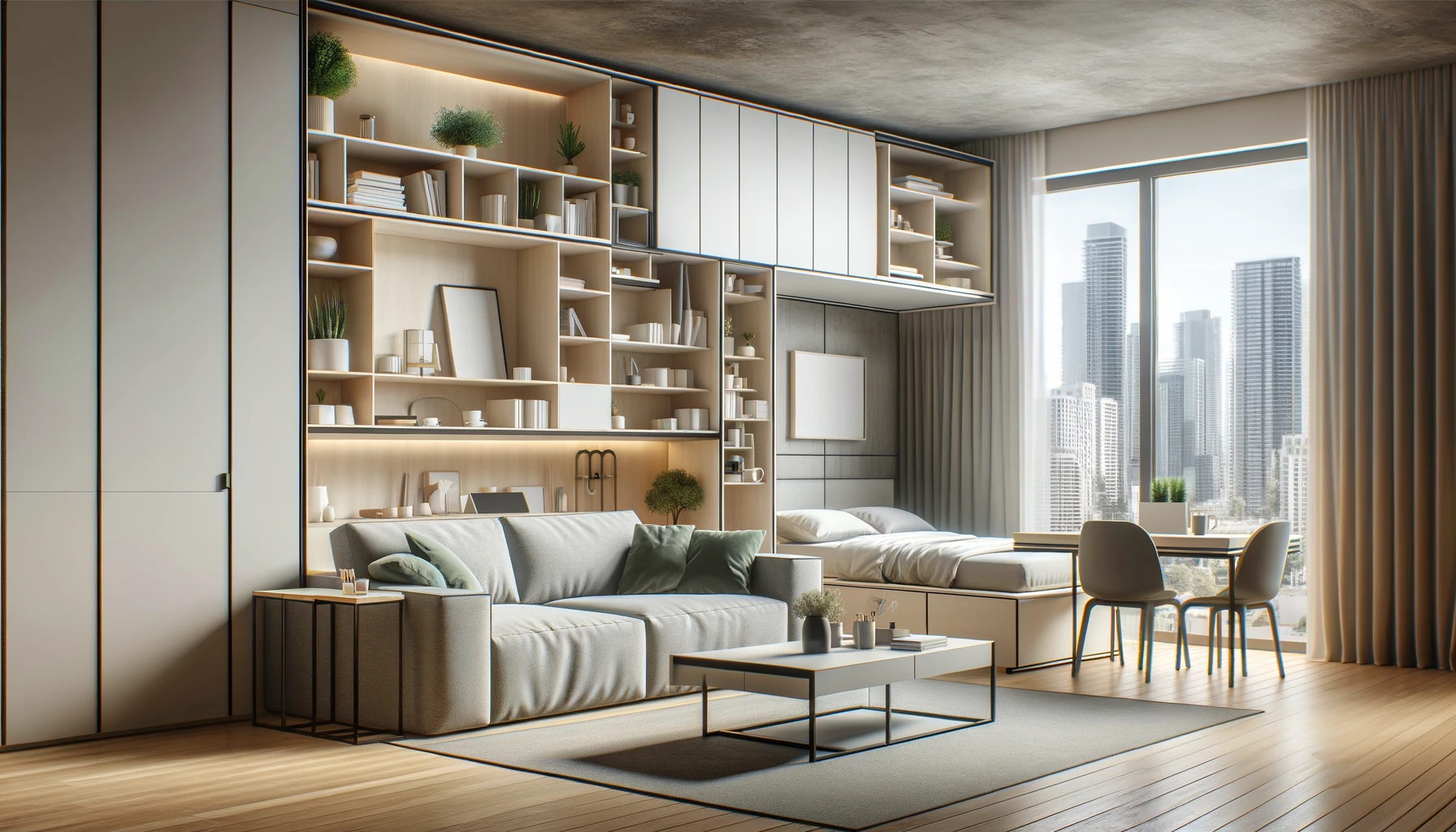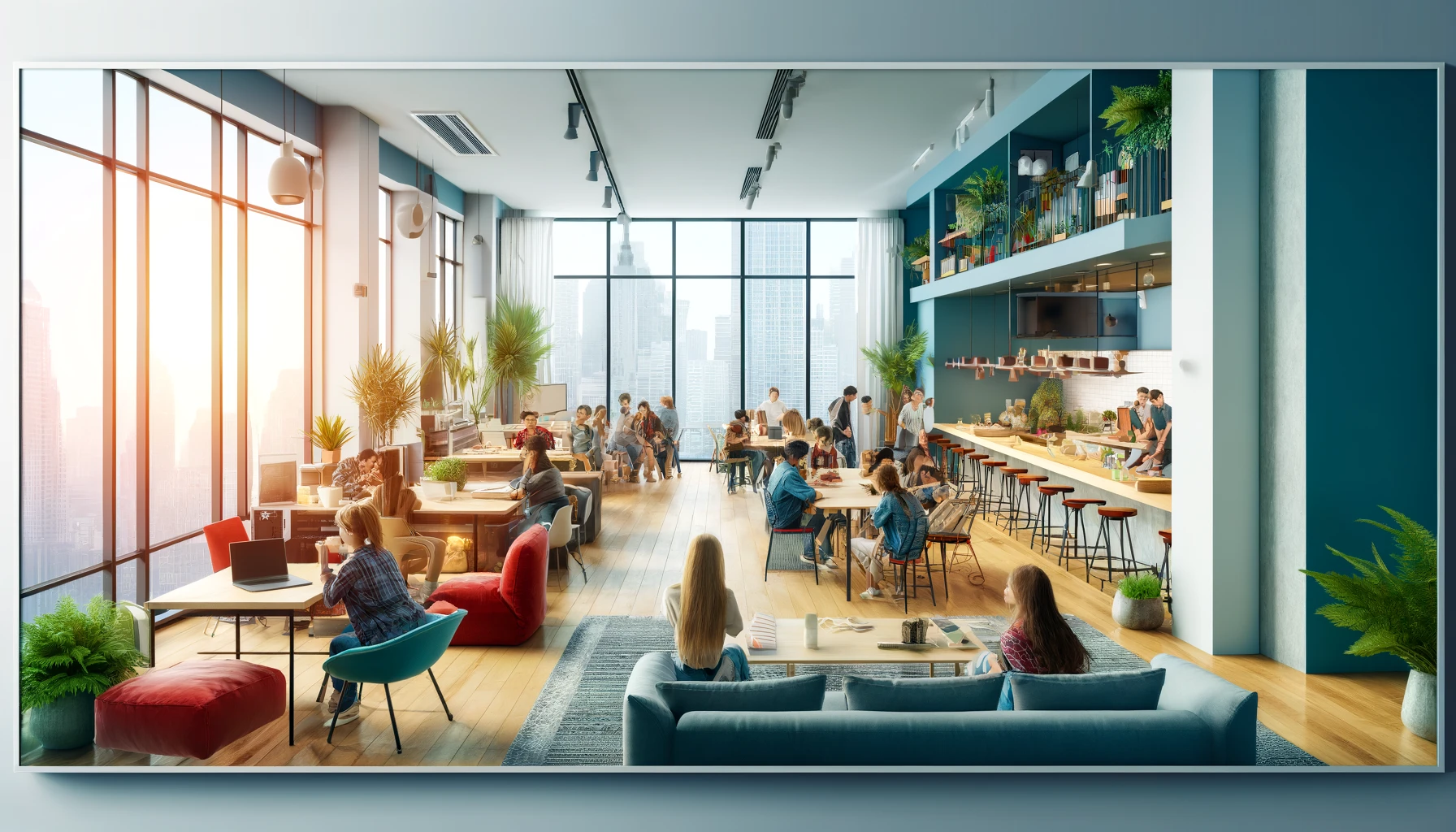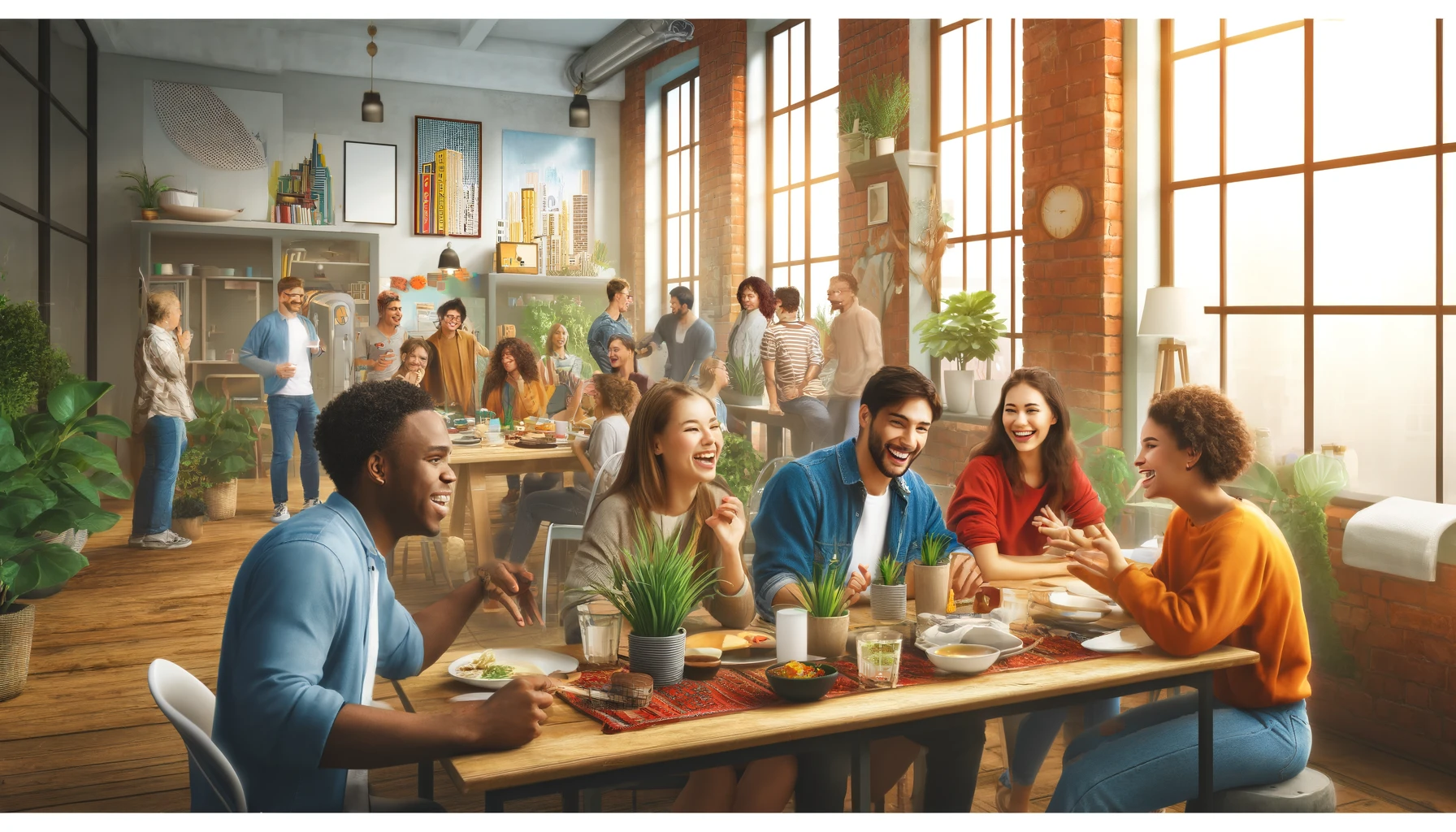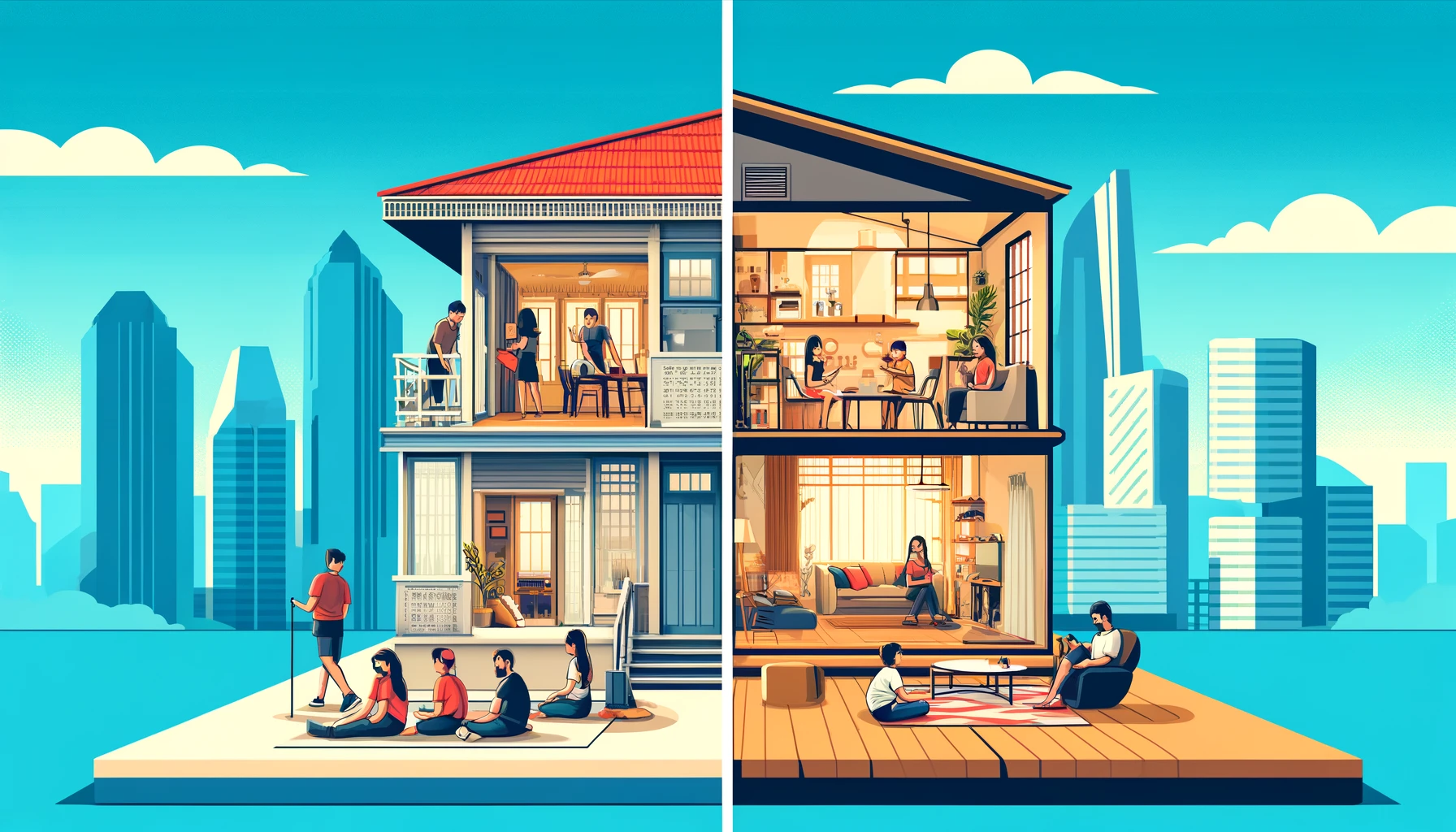What Does Flexible Living Mean?

Flexible living refers to a lifestyle or housing arrangement that adapts to the changing needs of individuals over time. This concept encompasses a variety of living spaces, from apartments and houses that offer modular or multi-functional areas, to communities designed to support a blend of work, live, and play activities. Flexible living emphasizes convenience, adaptability, and personalization, enabling residents to tailor their environments to their current life situations, whether they are single, part of a growing family, or retirees. It's about maximizing the utility and enjoyment of one’s living space in a way that traditional fixed layouts cannot.
Historical Evolution of Flexible Living
Medieval Times to Industrial Revolution
Historically, the concept of a fixed-purpose room was not always prevalent. During medieval times, large halls served multiple purposes—they were places where people ate, slept, and socialized. This multifunctional use of space was necessary due to limited resources and architectural technologies.
As the Industrial Revolution took hold, living spaces began to evolve in structure and function. The Victorian era marked a significant shift towards more specialized rooms in homes, particularly within middle and upper-class societies. This era emphasized distinct spaces for dining, living, and entertaining, reflecting a society increasingly focused on privacy and social status.
20th Century to Present:
For tenants today, especially in bustling urban centers like Singapore, the flexibility to adapt living spaces to various needs can significantly enhance quality of life. The rise of the gig economy and remote work trends also support this demand for adaptable living environments. Properties designed with these principles in mind often incorporate elements like foldable furniture, wall beds, and modular units that can be rearranged as needed.
Understanding these trends and their historical roots can help you as a tenant to choose a living space that not only meets your immediate needs but also provides the flexibility to adapt to changing circumstances. Whether you're a professional seeking a transient living arrangement or a student needing a temporary home that feels both functional and welcoming, the historical evolution of flexible living provides a foundation for innovative housing solutions available today.
Examples of Flexible Living Environments

If you're considering flexible living options in Singapore or Southeast Asia (SEA), here are five types of properties tailored to meet the needs of tenants looking for flexibility and convenience:
Co-living Spaces: Popular in Singapore due to the high cost of living, co-living spaces offer private bedrooms with shared common areas like kitchens, lounges, and sometimes even workspaces. These setups often include utilities, cleaning services, and community events, making them ideal for expats, students, or young professionals seeking a social environment and a hassle-free setup.
Serviced Apartments: Serviced apartments are fully furnished and come with amenities such as housekeeping, laundry services, and sometimes facilities like gyms and pools. This option is perfect for those on short-term assignments or those who prefer a more private living arrangement but with hotel-like amenities.
Executive Condominiums (ECs): ECs are a type of housing in Singapore that blends public and private housing features. They are more affordable than private condominiums but offer similar amenities such as security, swimming pools, and recreational facilities. This option is suitable for those who want the comfort of upscale living without the high costs associated with private condos.
Shophouses: In heritage-rich areas like Chinatown, Little India, and along the Singapore River, traditional shophouses have been converted into residential spaces. These offer a unique living experience combining historical architecture with modern interiors. They're perfect for those who appreciate a blend of cultural heritage and contemporary living.
Integrated Developments: These are multi-use complexes that combine residential units with commercial spaces, often including malls, offices, and sometimes even hotels. Integrated developments offer the ultimate convenience of having amenities and transport options right at your doorstep. Examples include The Interlace and DUO Residences in Singapore, which cater well to those who value a lifestyle where work, play, and home are seamlessly integrated.
Challenges of Flexible Living: Addressing Common Concerns and Solutions
When considering flexible living arrangements abroad, particularly for expats and students, it's essential to navigate both the opportunities and challenges effectively. Here are some detailed points to consider:
Privacy in Shared Spaces
Challenge: Living in close quarters with others can sometimes lead to a perceived lack of privacy and personal space, which can be stressful, especially in a new country.
Tip: Seek flexible living spaces that offer well-designed layouts maximizing personal space. Look for features like private bathrooms, individual lockers, or soundproofed rooms. It's also advisable to establish personal boundaries early on with your housemates through open and respectful conversations.
Security Concerns
Challenge: In communal living setups, personal and communal security can become a concern, with the responsibility shared among all tenants.
Tip: Opt for living arrangements that have robust security measures in place, such as secure access, CCTV surveillance, and clear safety protocols. Participating in the selection process of new tenants if possible, or engaging in community meetings can also help enhance the sense of security.
Management of Common Areas
Challenge: The shared use of facilities like kitchens, bathrooms, and recreational areas can lead to conflicts if not managed well.
Tip: Engage in drafting and adhering to community rules regarding the use of shared spaces. Participate actively in scheduled cleaning rosters and respect the communal property. Regular community meetings can help address and resolve any issues collectively.
Community Integration
Challenge: Building a cohesive community spirit can be challenging, especially with a transient tenant population that often characterizes flexible living.
Tip: Take initiative in community-building activities such as communal meals, movie nights, or local outings. These activities can foster relationships and help you feel more at home in a new environment. Volunteering to organize events can also be a great way to integrate and contribute to the community.
Conflict Resolution
Challenge: Differences in background, lifestyle, and expectations can lead to misunderstandings and conflicts in a shared living environment.
Tip: Develop your conflict resolution skills and engage in open, honest communication. Approach conflicts as opportunities for learning and understanding rather than confrontations. Utilizing mediation services provided by the living facility can also be beneficial.
5 Benefit of Flexible Living

When exploring flexible living options as a student or expat, understanding the benefits of such arrangements can significantly enhance your living experience. Here are five notable benefits, particularly relevant to those studying or working abroad in regions like Southeast Asia and specifically Singapore:
Cost Efficiency: Flexible living environments, such as co-living spaces, are often more cost-effective compared to traditional housing. This is particularly advantageous in high-cost areas like Singapore. Rent generally includes utilities, internet, and access to shared facilities, which can significantly reduce monthly expenses.
Built-in Community: One of the standout advantages of co-living is the immediate access to a community. This can be incredibly beneficial for expats and international students looking to establish new social networks. Co-living spaces often organize social events and activities, providing an easy way to meet new people and integrate into the local culture.
Flexibility: Flexible living options typically offer short-term leases, which is ideal for those who are not looking to commit to a long-term rental agreement. This is perfect for expats on temporary assignments or students who may need housing for just the duration of their study term.
Convenience and Amenities: Many flexible living spaces come fully furnished, with amenities such as laundry facilities, kitchens, and sometimes even gyms and pools. This setup allows you to move in with minimal hassle and live comfortably without the need to purchase furniture or sign up for utility services.
Opportunities for Personal and Professional Growth: Living in a dynamic, culturally diverse environment can greatly enhance your personal and professional development. The interaction with a global community not only broadens your social and professional networks but also improves your adaptability and understanding of different cultural perspectives.
Comparing Costs in Singapore: Traditional vs. Flexible Living Spaces

Traditional Living Spaces (Private and HDB Flats)
Traditional living spaces in Singapore, such as private condominiums and HDB flats, offer a wide range of options in various locations. The costs for these units vary significantly depending on the location and type of property. For instance, you might pay anywhere from S$800 to S$5,000 per month for a rental, with annual costs ranging roughly between S$9,600 and S$60,000. These properties typically require a longer lease commitment and might include additional costs like stamp duty and deposits.
Flexible Living Spaces (Co-living and Serviced Apartments)
Co-living spaces are gaining popularity, especially among young professionals and expats. They provide a flexible lease term, usually with utilities and furniture included, and often no need for heavy deposits. Monthly costs can range from as low as S$800 to S$2,550, making them a viable option for those seeking less commitment and more convenience. On the other hand, serviced apartments offer similar benefits with added luxury, such as housekeeping and concierge services, but at a higher cost, generally between S$2,900 and S$7,000 per month.
Cost Comparison Example
To give you a clearer picture, let’s consider the costs of co-living spaces versus traditional private apartments:
Co-living spaces: For a standard room in areas like Newton or Tiong Bahru, prices can start from around S$1,300 per month. These spaces usually come fully furnished with utilities and weekly housekeeping included, which can be a significant saving on household expenses.
Traditional apartments: A typical one-bedroom apartment in a comparable area can cost anywhere from S$1,400 to S$3,500 per month, excluding utilities and furniture. Additionally, you might need to pay a deposit equivalent to one or two months' rent plus stamp duty.
Co-living offers a significant cost advantage, particularly for those who value flexibility and community living without the hassle of managing utility bills and furnishing a home. For students and expats in Singapore, where housing can be a major expense, understanding these options can lead to substantial savings and a more customized living experience based on personal preferences and duration of stay in the country.
Discover Your Perfect Home with Clicks® - The Global Real Estate Social Network

Are you a home searcher navigating the housing market? With Clicks® Real Estate Social Network, finding your ideal living space has never been easier or more convenient!
Explore Properties Worldwide
Whether you're searching for a vibrant city apartment or a tranquil beachfront villa, Clicks® offers a wide array of properties available for rent or purchase globally. Tailor your search to match your lifestyle preferences and discover your dream home with just a few taps on our user-friendly app.
Direct Contact with Sellers and Landlords
Say goodbye to the frustration of dealing with intermediaries. Clicks® enables you to directly engage with property owners. You can easily inquire about properties, arrange viewings, and negotiate terms all within one platform. This direct interaction ensures transparency and helps you make informed decisions quickly.
Insights from Real Neighbors
Get to know your potential new neighborhood with insights from real residents. Our platform allows you to connect with locals who can offer valuable advice, reveal hidden gems in the area, and provide tips that only insiders know.
Exclusive Access to Pre-Market Properties
With Clicks® PVP (Pre-Valued Properties), gain exclusive access to properties before they hit the open market. This feature allows you to avoid competitive bidding wars and secure your ideal property smoothly and straightforwardly.
Join Clicks® Today!
Don’t miss out on finding your perfect home. Join the Clicks® Real Estate Social Network now and start connecting with a global community of real estate enthusiasts. Whether you're renting, buying, or just exploring, Clicks® is your ultimate partner in the world of real estate.
Clicks® - Connect, Discover, and Settle In Your Ideal Home Today!